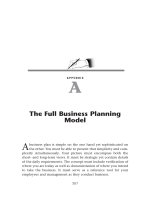Becoming a successful manager
Bạn đang xem bản rút gọn của tài liệu. Xem và tải ngay bản đầy đủ của tài liệu tại đây (2.05 MB, 225 trang )
SUCCESSFUL
MANAGER
BECOMING A
Powerful Tools for Making a Smooth
Transition to Managing a Team
J. Robert Parkinson, Ph.D., and Gary Grossman
New York Chicago San Francisco Lisbon London Madrid Mexico City
Milan New Delhi San Juan Seoul Singapore Sydney Toronto
Copyright © 2010 by J. Robert Parkinson and Venn Strategy Group Inc. All rights reserved. Except
as permitted under the United States Copyright Act of 1976, no part of this publication may be
reproduced or distributed in any form or by any means, or stored in a database or retrieval system,
without the prior written permission of the publisher.
ISBN: 978-0-07-174556-7
MHID: 0-07-174556-4
The material in this eBook also appears in the print version of this title: ISBN: 978-0-07-174164-4,
MHID: 0-07-174164-X.
All trademarks are trademarks of their respective owners. Rather than put a trademark symbol after
every occurrence of a trademarked name, we use names in an editorial fashion only, and to the
benefi t of the trademark owner, with no intention of infringement of the trademark. Where such
designations appear in this book, they have been printed with initial caps.
McGraw-Hill eBooks are available at special quantity discounts to use as premiums and sales
promotions, or for use in corporate training programs. To contact a representative please e-mail us
at
To Susan, my wife, to my twin sons, Jacob and Maxwell,
and to my mother, Joan Grossman
—G. G.
To Eileen, my wife and partner for four decades. It just doesn’t
seem possible that so much time has passed.
—J. R. P.
This publication is designed to provide accurate and authoritative information in regard to the
subject matter covered. It is sold with the understanding that the publisher is not engaged in
rendering legal, accounting, or other professional services. If legal advice or other expert assistance
is required, the services of a competent professional person should be sought.
TERMS OF USE
This is a copyrighted work and The McGraw-Hill Companies, Inc. (“McGrawHill”) and its
licensors reserve all rights in and to the work. Use of this work is subject to these terms. Except as
permitted under the Copyright Act of 1976 and the right to store and retrieve one copy of the work,
you may not decompile, disassemble, reverse engineer, reproduce, modify, create derivative works
based upon, transmit, distribute, disseminate, sell, publish or sublicense the work or any part of it
without McGraw-Hill’s prior consent. You may use the work for your own noncommercial and
personal use; any other use of the work is strictly prohibited. Your right to use the work may be
terminated if you fail to comply with these terms.
THE WORK IS PROVIDED “AS IS.” McGRAW-HILL AND ITS LICENSORS MAKE NO
GUARANTEES OR WARRANTIES AS TO THE ACCURACY, ADEQUACY OR COMPLETE-
NESS OF OR RESULTS TO BE OBTAINED FROM USING THE WORK, INCLUDING ANY
INFORMATION THAT CAN BE ACCESSED THROUGH THE WORK VIA HYPERLINK OR
OTHERWISE, AND EXPRESSLY DISCLAIM ANY WARRANTY, EXPRESS OR IMPLIED,
INCLUDING BUT NOT LIMITED TO IMPLIED WARRANTIES OF MERCHANTABILITY
OR FITNESS FOR A PARTICULAR PURPOSE. McGraw-Hill and its licensors do not war-
rant or guarantee that the functions contained in the work will meet your requirements or that its
operation will be uninterrupted or error free. Neither McGraw-Hill nor its licensors shall be liable to
you or anyone else for any inaccuracy, error or omission, regardless of cause, in the work or for any
damages resulting therefrom. McGraw-Hill has no responsibility for the content of any information
accessed through the work. Under no circumstances shall McGraw-Hill and/or its licensors be
liable for any indirect, incidental, special, punitive, consequential or similar damages that result
from the use of or inability to use the work, even if any of them has been advised of the possibility
of such damages. This limitation of liability shall apply to any claim or cause whatsoever whether
such claim or cause arises in contract, tort or otherwise.
iiiiii
Contents
Acknowledgments v
A Note from the Authors vii
Part I: Knowing the Territory 1
1 What Is a Professional Manager? 3
2 Defi ning Your Role 15
3 The Staff Mosaic—Working Together 23
4 Understanding Each Person in Your Department 39
5 Clarifying What You and Your Employees
Have in Common 47
Part II: Establishing a Solid
Departmental Foundation 53
6 Adopting Positive and Productive Attitudes 57
7 Perpetuating a Problem-Solving Culture 69
8 Listening—
Really Listen and You Will Hear
More than Words 87
9 Mastering the Art of Asking Questions 103
10 Eliminating Weeds from Your Departmental Garden 117
11 Giving the Gift of Constructive Criticism 127
Part III: Building on Your Foundation 135
12 Hiring the Right People 139
13 Conducting Meaningful Performance Reviews 149
14 Delegating Effectively and
Empowering Employees to Take Risks 159
15 Mastering Productive Meetings Is as Easy as PIE 171
16 Resolving Confl icts 185
17 Handling Harassment 195
18 Moving Forward 203
Appendix 207
Index 213
iv Contents
vv
Acknowledgments
THEREAREANUMBEROFpeople to thank for contributing to the
production of this text. First, we must thank all of the managers
with whom we have been associated throughout our professional
careers. They provided much of the research material that made
this endeavor possible. Next, we owe a great deal to our literary
agent, Jacquiline Flynn, whose thoughtful and insightful guidance
led us through the publishing process. In addition, we appreciate
the creative contributions of Lynn Miller and Jeff Shankerman.
Finally, we owe a heartfelt thanks to our editor, Judith McCarthy,
for inviting us to work with her; copyeditor Katherine Hinkebein;
and the rest of the publishing staff at McGraw-Hill.
Dedication to Jack H. Grossman
“Y
ou give but little when you give of your possessions. It is
when you give of yourself that you truly give.”
—Kahlil Gibran, The Prophet
I WAN T TO T HA N K MY friend and colleague, Jack H. Grossman,
for all he contributed to this book. He is no longer with us, but his
spirit lives on, and his convictions continue to be relevant.
During many years of stimulating conversation and sharing
business “war stories” about people we knew and with whom we
had worked, he helped shape many of my ideas.
Those ideas—and many of his own words—are integral parts
of this book.
So, thanks, Jack. I’m sure you’ll approve of what we have
written.
—J. R. P.
I AM GRATEFUL TO J. Robert Parkinson for suggesting we lovingly
dedicate this book to my father, Jack H. Grossman, who coau-
thored the original edition. In serving as coauthor of this revised
volume, I was reminded time and again of how the principles in
this book were woven into the fabric of his being. Its contents
refl ect the type of life my father lived and the style of helpful infl u-
ence he imparted to those fortunate enough to have had him as a
teacher, advisor, parent, or some combination of the three.
Dad, you can rest peacefully knowing you have and will con-
tinue to make this world a better place . . . forever.
Love always and forever to my father, teacher, mentor, and
lifelong best friend.
—Gary Grossman
vi Acknowledgments
viivii
A Note from
the Authors
THE PURPOSE OF THIS BOOK is to help you, as a new manager,
quickly assimilate some of the basic knowledge you must have
and actions you must put into practice in order to succeed. For
you to gain maximum benefi t from the material, we recommend
that you keep a manager’s journal. In it, note the thoughts, ideas,
and insights you generate while reading. A manager’s journal is
also an excellent place to record your completed exercises, which
are presented throughout these chapters, as well as other useful
reminders and information that will help you become the out-
standing manager you have the potential to be.
This page intentionally left blank
1
PA RT I
Knowing the
Ter ritor y
Congratulations on being pro-
moted to manager! By accepting this promotion, you assumed
three essential and overlapping responsibilities: to become a
professional manager, to get people of diverse global and tech-
nological backgrounds and skills to fulfi ll their individual and
departmental objectives, and to create a spirit of professionalism
and teamwork within your department, wherever they may be
located.
We’ll begin by taking a bird’s-eye view of what your job actu-
ally is—that is, your implied promises and obligations to your
staff.
As you study Part I, keep in mind three key principles you
need to follow to be a successful professional manager:
• Strive to create a departmental culture that enables people
under your infl uence to be productive and to grow, wherever
they are located.
• Surround yourself with people who are trustworthy and whom
you respect, both personally and professionally.
• Establish and employ interpersonal and technological commu-
nication protocols that are effective for each member of your
staff.
2 KNOWING THE TERRITORY
3
1
What Is a
Professional Manager?
ASYOUPROBABLYREALIZE, ACHIEVING the objectives of a successful
manager is an arduous job. Managing a department effectively is
an ongoing process that consists of developing mutually rewarding
relationships with your employees. You will need to create healthy
partnerships with each of the people under your infl uence.
The basic ingredients of all such committed relationships are
the same: mutual respect and trust spiced with genuine caring
attitudes.
You’ll know you’ve successfully created healthy manager–staff
member relationships when your employees feel the department
Professionals exhibit quiet strength to make the diffi cult
look easy.
Small acts of human kindness done consistently
characterize a mensch.
4 KNOWING THE TERRITORY
belongs to them as well as to you. That feeling, in all likelihood,
will motivate them to be vital contributors to the department and
will discourage them from the subtle ways in which disgruntled
or dissatisfi ed employees can hinder departmental develop-
ment. Once a genuine team spirit evolves and bonding occurs,
you, your staff, and the organization for which you work will
profi t in every way—emotionally, intellectually, and ultimately
fi nancially.
As the manager, you need to enable the formation of such
partnerships. You must preserve the integrity of each of your
manager-employee relationships and protect that integrity from
being threatened or invaded by negative staff members or negative
workplace situations. As challenging as it may be in the diverse
and decentralized workplace to create and uphold the partner-
ships between you and your employees, that’s what you must do
to succeed as a truly professional manager.
To achieve the status of professional manager, take the follow-
ing actions:
• Assume responsibility for creating a fertile workplace cul-
ture—an atmosphere that stimulates people of diverse abili-
ties, personalities, and backgrounds to be productive and
to work harmoniously with one another. (You know your
departmental culture is fertile when its members contribute
willingly, enthusiastically, and fully toward their personal
and company goals.)
• Make it safe for your staff to communicate openly and pro-
ductively with you and each other, and to take intellectual
risks without fear of repercussions.
• Create a structure that fosters personal and career develop-
ment and growth.
What Is a Professional Manager? 5
• Be the inspiration and guiding force that leads your depart-
ment forward.
These are tall orders, but they are, in part, the responsibilities
you assumed when you donned the mantle of manager. When you
accepted this position, your implied promise, assuming you want
to be the best leader you can be, was to be an effective teacher,
a sensitive counselor, and a master gardener. A professional and
successful manager assumes all three roles.
Before we examine the nature of these roles, let’s discuss what
it means to be a professional manager—or, for that matter, a pro-
fessional in any occupation—and what distinguishes professionals
from nonprofessionals. The distinction between professionals and
nonprofessionals is based on more than the results they achieve
or whether or not they get paid for their work. Rather, the basic
differences center on how they approach their work, how they
interact with their clients or customers, and how they present
themselves to the world.
Professionals Versus Nonprofessionals
Professionals know what they’re doing and are in full control
of their domain. This control, which stems in part from profes-
sionals’ thorough knowledge of their areas of expertise, enables
them to execute responsibilities with utmost confi dence. Convey-
ing a true image of quiet strength, they engender trust from the
people under their infl uence. Conversely, nonprofessionals are
unsure of themselves, in part because they lack the knowledge
and experience to be surefooted. This lack of confi dence in what
they’re doing causes them to be defensive when their decisions
6 KNOWING THE TERRITORY
are questioned. Ultimately, the nonprofessionals’ lack of confi -
dence, defensive nature, and apparent lack of complete control
over their domain cause others to distrust them and their judg-
ments. Such conditions inevitably create chaos and a negative
work environment.
Professionals focus their energies on fulfi lling their responsi-
bilities and achieving results, not on portraying a particular image.
Because professionals believe that their actions, performance, and
accomplishments speak for themselves, the positive image oth-
ers have of them is based on tangible results, not on what they
say about themselves. Nonprofessionals talk about what they plan
to do, but their talk is generally not followed by actions. This is
a symptom of their desire to create a favorable image. For non-
professionals, looking good seems to be of greater concern than
actually being good. However, in reality, they don’t look good,
because they don’t follow through on their promises, and as a
result, they are frequently criticized for “talking a better game
than they play.”
Professionals make what they do look easy. This is a result
of their awareness of what’s required to excel and their dedica-
tion to perfecting their skills. Nonprofessionals often struggle
to accomplish what is required of them. It’s as if they’re not
sure of themselves and what constitutes appropriate actions, so
they muddle along in pursuit of undefi ned and underdeveloped
objectives.
Professionals are subtle when performing their jobs. They ful-
fi ll objectives without calling attention to themselves and their
activities and without fl aunting their position. Recipients of their
services know they’re benefi ting, but they don’t know the minutia
of what the professional is doing to effect this result. Of profes-
sional managers we have known, their staff members say things
What Is a Professional Manager? 7
like, “I don’t know what he does to gain cooperation, but we want
to cooperate.” Or, “I learn from my manager, but it doesn’t seem
that she actually teaches.”
Professionals in a management position gain cooperation
without domination and power without force. Not only are non-
professionals obvious about what they do, but also their intentions
are transparent and suspect. Because nonprofessionals are moti-
vated mainly by ego rather than the desire to be of service to oth-
ers, they tend to misuse their authority and power. It’s as if they’re
wearing a shirt emblazoned “I am boss.” Of course, people who
work for such managers see right through them and either learn
to play the manager’s childish games or leave the department in
disgust.
Professionals walk their talk. Their actions consistently refl ect
their beliefs and the principles they advocate. While some nonpro-
fessionals may be knowledgeable and may voice sound and lofty
beliefs, for the most part, their actions are inconsistent with their
stated beliefs. It’s as if they are two different people.
Professionals are highly disciplined and, therefore, consis-
tently do what is required in order to move forward. They are
motivated by the desire to honor their profession and to excel, and
their actions are committed to these objectives. Nonprofessionals
are undisciplined and tend to work only when they feel like it. In
general, this is because they’re not fully committed to fulfi lling
their stated objectives.
Professionals tend to be task and goal oriented; therefore, their
efforts are appropriate and lead to meaningful results. Although
they know how to have fun, and they often do, for them frivolity
has its time and place. Often, nonprofessionals allow themselves
to get caught up with issues tangential to main objectives. They
are frequently accused of not taking seriously the jobs or projects
8 KNOWING THE TERRITORY
they undertake. They are also inappropriately frivolous and allow
themselves to become mired in matters that have nothing to do
with attaining meaningful results.
As you can see, professionalism and success as a manager
are more than merely titles, credentials, and getting paid well
for what one does. They are about a person’s demeanor and atti-
tude when dealing with a disparate group of people and properly
handling a variety of work-related issues or problems. The most
important thing when all is said and done is, be a mensch.
Being a Mensch
Being a successful manager begins with being a good person—a
mensch. A mensch is a respectful and genuine person who is
sensitive and appropriately responsive to others’ feelings. To
qualify as a mensch, you must embody and consistently exhibit
the following principles, attitudes, and behaviors in dealings with
people:
• Be a perpetual student and learn from everyone, regardless
of education, age, position, status, or geographic culture.
• In your desire to understand people, ask appropriate ques-
tions, in an appropriate way, at an appropriate time, and in
an appropriate place.
• Act responsibly and kindly toward yourself and others.
• Listen attentively to what people say, both verbally and non-
verbally, and respond appropriately to their messages.
• Demonstrate a genuine regard for all people’s feelings, and
accept those feelings as being valid.
What Is a Professional Manager? 9
• Be sensitively forthright and honest with people, leaving
little to the fate of imagination and confusion.
• Don’t allow defensiveness to dictate actions; all actions
should be guided by a desire to be helpful and cooperative.
• Make people feel valued by asking for their opinions,
requesting their help, praising commendable performance,
and being polite and courteous at all times.
In short, by being considerate, righteous, and positive in all deal-
ings with people, a mensch builds healthy communication bridges.
By incorporating the qualities of a mensch into your managing
style, you will foster positive communications and actions among
your employees, your customers, and yourself.
In addition to being a mensch, a professional manager must
fi ll three major roles: teacher, counselor, and gardener.
A Professional Manager’s Primary Role:
Be an Effective Teacher
To be an effective teacher, dedicate yourself to expanding your
“students’” knowledge, skills, vistas, and problem-solving abili-
ties. Your challenge is to provide them with all the tools and
encouragement they need to become independent thinkers and
productive contributors to your department. To illustrate how you
might go about achieving these results, let’s go back in time and
identify possible role models. You may want to note your observa-
tions in your manager’s journal.
Recall one or two of the best teachers you ever had. Envision
them in the classroom, interacting with you and other students.
10 KNOWING THE TERRITORY
What made these interactions special? Did you look forward to
coming to class, and if so, why? What specifi cally did they consis-
tently do that made such a lasting impression on you?
In all likelihood, whatever impressed you about these teach-
ers stemmed from their intent to transmit their knowledge, their
desire to help you understand the material they were teaching, and
their commitment to stimulating you to think clearly and inde-
pendently. Chances are their genuine caring made you feel spe-
cial and encouraged you to develop a strong interest in what you
were learning. Finally, they probably never said or did anything
to embarrass you, even when you asked a question that you, and
perhaps your classmates, thought was dumb.
To be a professional manager, you should aspire to exhibit
qual ities similar to those exemplifi ed by outstanding teachers,
but remember: your success as a manager depends, to a sig-
nifi cant degree, on the effectiveness of all your staff members.
That is why you should do everything within your power to
help your employees realize their potential. You do that by exer-
cising your power responsibly, just as your great teachers did.
Always respond appropriately to questions without making the
questioner feel stupid or guilty. And when it has become clear,
through tangible results, that your employees learned what you
taught them, reinforce their learning with sincere praise and
acknowledgment.
What else can you do to stimulate your “students’” desire and
ability to learn and develop? Keep this question in mind while read-
ing the rest of this section. At the end, write down your thoughts,
ideas, and insights in your manager’s journal. When it’s appropri-
ate, put these thoughts into practice, and monitor the results of
your actions.
What Is a Professional Manager? 11
A Professional Manager’s Secondary
Role: Be a Sensitive Counselor
Companies often get more than they bargain for when they hire
someone. While companies hire people for their abilities, intel-
lect, skills, and potential to contribute to the organization, they
will also receive each employee’s unique attitudes, emotions, and
interests. Because staff members are people fi rst and producers
second, their productivity is affected emotionally by experiences
and events both at home and at work. This is especially relevant
for remote staff members. As a professional manager, one signifi -
cant challenge is to stabilize a range of emotionally charged issues
and divergent perceptions that evince anger, sadness, jealousies,
upsets, and more. These situations will require you to be a sensi-
tive counselor, which is an integral part of being a professional
manager.
In the role of counselor, you are an authority fi gure whose
objective is to listen attentively and sensitively to employees who
trust you. By listening thoughtfully, you demonstrate that you
genuinely care, and your recommendations will be taken seri-
ously. Realize that neither you nor anyone else can solve another
person’s problems; each of us must assume that responsibility our-
selves. However, in acting as a concerned and sensitive counselor,
invite troubled employees to talk about what is interfering with
their effectiveness and then offer options for resolving diffi cul-
ties. The goal is not to develop a therapeutic relationship with an
employee, as would a psychologist, psychiatrist, or social worker.
Rather, conduct one or two productive meetings with a troubled
employee that address specifi c behavioral symptoms that have job-
related negative consequences.
12 KNOWING THE TERRITORY
A Professional Manager’s Third Role:
Be a Master Gardener
If you ask serious gardeners what the secret to their success is, they’ll
tell you something along the lines of: “First, I have to create a fertile
culture that stimulates healthy plant growth. Next, I must ensure that
the different species of plants in the garden are compatible. And fi nally,
I have to maintain the garden by watering, cultivating, weeding, and
fertilizing it, and by providing special attention to plants that require
it.” Master gardeners will also tell you that this is a full-time job yield-
ing great joy when they see the positive results of their efforts.
It doesn’t require much of a stretch to apply the rules and prin-
ciples of successful gardening to being a successful professional
manager. The “human plants” you choose to be part of your depart-
mental garden have to refl ect your values and be willing to contribute
to your vision of what you want your “garden” to produce. Assum-
ing you hire capable, high-potential, and conscientious people, your
abilities and skills as a manager will determine how productive and
responsive they will be. The chance of managing a cooperative team
that’s full of potential is great if you do your job well.
A signifi cant part of your job is to see to it that “weeds” and
other threats to the health of your departmental garden don’t
drain it of its nutrients or adversely affect employees’ morale and
productivity. The single most treacherous weed with which you
will need to contend is defensiveness.
Helping you fulfi ll each of these three roles so you can become
an excellent professional manager is our aim. Make this book your
personal guide for building a solid, long-lasting departmental founda-
tion and healthy structure. By approaching this material as you would
an ongoing one-on-one seminar designed just for you, you can realize
the implied promise of the book’s title. We wish you success in making
a graceful transition from managing yourself to managing others!
What Is a Professional Manager? 13
• Regarding the best teachers you ever had, did you look forward
to their classes, and if so, why?
• What specifi cally did they consistently do to make a lasting
impression on you?
•What specifi cally can you do that would make your employees
look forward to coming to work every day and approach their
jobs with enthusiasm?
• How can you move right on the continuum between
nonprofessional and professional manager?
Questions to Consider
Discovery Lesson
Do you know someone in your personal or professional life who exhib-
its quiet strength? They just get things done, with little fanfare or fric-
tion. The next time you see them, watch what they do and note a few
examples that you notice. Specifi cally, note:
• What they accomplished
• How they make people around them feel
• What made it different from someone else trying to accomplish the
same task
This page intentionally left blank
15
2
Defi ning Your Role
BEFORE YOUR PROMOTION, YOU MANAGED only one person: your-
self. In this limited managerial function, your efforts and effec-
tiveness alone determined your success. You must have been good
at what you were doing or you wouldn’t be in your current position
of departmental manager. But your “doing” skills that were once
admired and rewarded are not the only ones you get paid for now.
The new rules for succeeding are substantially different.
In your role as departmental manager, your two main respon-
sibilities are:
• To stimulate the members of your staff to be the best they
can be
Sensitivity is as important to managing people as music
is to dancing.
A professional manager is an effective teacher, a
sensitive counselor, and a master gardener.
16 KNOWING THE TERRITORY
• To meld a diverse group of skilled individuals into a cohesive
team of people who work well together to accomplish the
goals you’ve been charged to achieve
Your likelihood of fulfi lling those two responsibilities will increase
if you embody this precept: As a manager, I am only as good as
the people under my infl uence; therefore, helping them become as
effective as they can be is my number one priority.
In your managerial position, you are like a master gardener.
Of course, the garden of which you’re in charge consists of
people, who are considerably more complex than varied fl ow-
ers and vegetation, but they both require fertile soil as well as
proper care and feeding for them to fulfi ll their potential. Some
people, just like exotic fl owers, may even require special treat-
ment. Regardless of their differences, what’s obvious about both
gardens is that neither can ever be taken for granted if it is to
fl ourish.
Making Sure Your Garden Flourishes
Because you head the department, all actions and standards of
performance must refl ect your mission, your values, and your
philo sophies concerning the way people treat others both within
and outside the group. Being your garden’s chief architect, you
must establish its culture and make sure the people under your
infl uence perpetuate the principles that govern it.
As you embark on your fi rst important project, which is to
mold your department’s culture, keep in mind a quality common
to excellent managers we have known. We call that quality quiet
strength.









